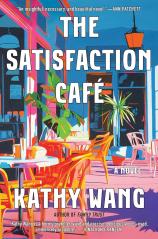Reading Group Guide
Discussion Questions
The Satisfaction Café

1. In the opening paragraph, the reader is told that Joan “was married for only six weeks before she stabbed her husband” (page 3). How does this line set up your expectations for the novel? What does it do for the tone of the book?
2. The novel is divided into four parts: “The Trick to a Good Marriage,” “The House Was Promised,” “The Demon Rock,” and “How to Start a Conversation.” How do the events in each section relate to their respective titles?
3. Joan fears the judgment of her family and friends when she gets divorced, yet ends up marrying Bill, a thrice-divorced American man. What role does divorce play in the novel? Discuss how the novel portrays divorce from various perspectives involved (spouses, children, friends).
4. Compare Joan’s marriage to Milton with her marriage to Bill. How are they different? Are there any ways in which they are similar? How does Joan’s relationship with Bill transform across their life together?
5. Joan doesn’t “believe in telling people they would never die,” even when it comes to her children (page 88), but other characters (Misty, Bill and Lee) all fret about dying. How does the novel explore the end of life and its psychological effect on the characters?
6. When discussing Theo’s career wishes with Bill, Joan withholds her opinion, noting that “it was just one of those unfortunate circumstances of marrying a man who’s already lived a whole other life before meeting you” (page 108). Discuss the age and experience gap between Joan and Bill and how that affects their marriage. What are the expectations on each side?
7. Jamie quickly accepted Lee as his sister when Joan adopted her, and “Lee generally worshipped Jamie, in the manner that older siblings are worshipped ” (page 109). Talk about Jamie and Lee’s relationship. How does their relationship differ from the relationships between the other siblings in the novel?
8. Joan faces microaggressions throughout her life, such as being mistaken for her children’s nanny instead of their mother. How do these instances affect Joan? Her children? Would Joan’s reaction be different had she been born in a different era?
9. Bill is surprised to hear that Joan says she loves their children more than she loves him. According to Joan, “in Taiwan, you were always supposed to love the next generation more, or at least say you did” (page 125). Why do you think this is? How do you feel about this sentiment, and is it different from your own cultural norms?
10. Joan and Misty’s respective pregnancies and experiences of motherhood couldn’t be more different. Talk about motherhood and parenting in the novel. Does either woman have a balanced view of motherhood versus maintaining their own identity?
11. When discussing Japan’s host/hostess clubs, Joan thinks: “Young people like Lee and Marc imagined loneliness as a consequence --- something you did or didn’t do to end up on your own.... Youth didn’t understand, however, how much luck played into it, that loneliness wasn’t always a choice. Whereas at Joan’s age, you knew it was always somewhere ahead, waiting. It could happen to anyone (page 221). How is loneliness explored throughout the novel? Do you agree with Joan that one’s relationship to loneliness changes with age?
12. After opening the café, Joan finds herself “falling in love all over the place” (page 239). What role does love play in the novel? How is love characterized and experienced? Is a particular kind of love (friendship, romantic, familial) more represented than others?
13. Joan reconnects with Trevor, one of Bill’s friends, later in life and wonders what could have been. Eventually she wishes “he could have stayed as he was in her memory, a younger point of eternal possibility” (page 254). What do you think Joan means here? Why is this important to her?
14. When talking about one of her regular customers, Joan mulls over the concept of normalcy. She thinks, “Sure, Dustin’s habits may not have been normal. But was Lee and Jamie moving home, spending so much time with their mother, normal?” (page 273). What is considered “normal” in Joan’s world? In what ways does Joan’s life deviate from the norm?
15. After opening the Satisfaction Café, Joan feels “it was as if all the doors of her past were open and she could walk freely between. This is what the café had brought her” (page 291). Talk about the café and what it offers its customers. If there were a real Satisfaction Café, would you try it out? What sort of services and food dishes would your café offer?
The Satisfaction Café
- Publication Date: July 1, 2025
- Genres: Fiction
- Hardcover: 352 pages
- Publisher: Scribner
- ISBN-10: 1668068923
- ISBN-13: 9781668068922







